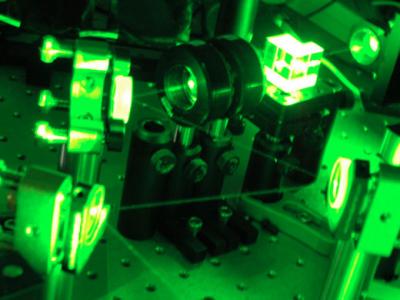Scientists have discovered a new scheme named “coherent photon conversion” to overcome all unresolved issues related to optical enforcement of quantum computing. The international team of experts headed by scientists from the Vienna Center for Quantum Science and Technology (VCQ) at the University of Vienna (group of Anton Zeilinger) has discussed this new scheme in this week’s issue of Nature.
 This is a photograph of the preparation setup for the strong green pump laser used for enhancing the nonlinearity for coherent photonic conversion. Credit: Image courtesy of IQOQI Vienna
This is a photograph of the preparation setup for the strong green pump laser used for enhancing the nonlinearity for coherent photonic conversion. Credit: Image courtesy of IQOQI Vienna
Quantum technology utilizes exclusively quantum features that include entanglement and superposition. Single photons are exceptional quantum information carriers, as they are naturally isolated from their surroundings. Besides, photon-based quantum computers, have exceptional speeds. However, prevailing schemes for preparation, processing and measurement of photons are ineffective.
Using the new scheme coherent conversion between separate photon states is possible by which the nonlinearity of a medium is improved by an high-intensity laser field. The method enables solving issues related to optical quantum computation. For instance, doubling of single photons deterministically can resolve the preparation and measurement issues and an innovative kind of photon-photon interaction contributes to effective quantum gates.
This novel quantum optics toolbox revealed by “coherent photon conversion” holds promise for a future nonlinear optical quantum computer.
In the first research, the group used non-linear glass fibers and photons for demonstrating the proof-of-principle of a technique appropriate for establishing the scheme. Although deterministic execution not been reached yet, the authors’ discoveries recommend how this could be achieved with advanced optical technologies, such as utilizing stronger lasers and highly nonlinear glasses.
The general concept of “coherent photon conversion” can be adapted to other physical systems as well like nanomechanical devices or atoms.